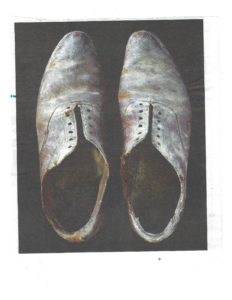One a recent TV Commercial, a happy-go-lucky pitchman compares buying insurance to selecting ice cream flavors: there is one for each need. Although his sale comparison method could be considered a Simile, he talks about the two actions as if they are almost the same. Thus, he calls his word choice, a Metaphor. A school student buying ice cream corrects him saying he is using a Simile. However, he actually did not use any Simile in his speech; as unlikely as it might seem, he was correct: it was a Metaphor.
A Simile is a figure of speech in which two things are compared using the word “like” or “as.” In Langston Hughes’s poem, “Harlem,” he asks “What happens to a dream deferred?/ Does it dry up/ like a raisin in the sun?” In reading George Orwell’s, 1984, most readers are not aware of the many Similes he uses throughout his book:
“The voice came from an oblong metal plaque like a dulled mirror which formed part of the surface of the right-hand wall.”
“They needed to rise up and shake themselves like a horse shaking off flies.”
Metaphors are figures of speech in which two things are compared, usually by saying one thing is another, or by substituting a more descriptive word for the more common or usual word that would be expected. For example:
All the world’s a stage/And all the men and women merely players.
He let the cat out of the bag
A watched pot never boils
Shakespeare uses both Similes and Metaphors to create a memorable love poem in Sonnet 18:
Shall I compare thee to a summer’s day?
Thou art more lovely and more temperate.
Rough winds do shake the darling buds of May,
And summer’s lease hath all too short a date.
Sometime too hot the eye of heaven shines,
And often is his gold complexion dimmed;
And every fair from fair sometime declines,
By chance, or nature’s changing course, untrimmed;
But thy eternal summer shall not fade,
Nor lose possession of that fair thou ow’st,
Nor shall death brag thou wand’rest in his shade,
When in eternal lines to Time thou grow’st.
So long as men can breathe, or eyes can see,
So long lives this, and this gives life to thee.
Shakespeare uses a Simile in line 2 when he asks how he can compare his love to a summer day. When he calls the buds of May, “darling,” he is using, Personification. See previous Litchatte.com posting. In line 9, “Thy eternal summer shall not fade,” he uses a Metaphor because he is directly saying that the summer is eternal and thus its glow won’t fade. The metaphor is extended in the concluding lines when he states, “So long lives this, and gives life to thee” by remembering his poem about his love.
Irony plays around with words such that the meaning implied by a sentence or word is actually different from the literal meaning. Often irony is used to suggest the stark contrast of the literal meaning being put forth. For example, on the surface, the phrase, Oh! What fine luck I have conveys the idea that the speaker is happy with their luck, but actually what they mean is that they are extremely unhappy and dissatisfied with their (bad) luck. Makes a lot of sense. Right?
In Sonnet 130, “My Mistresses Eyes are Nothing Like the Sun.” Shakespeare employs several poetic devices, including similes, metaphors, and the poem is actually a simile-denial. This new concept brings up the question of whether it is either a Great Irony or a Parody aimed at poets, perhaps even himself, who overuse Similes and Metaphors. His poem is presented and discussed below:
My mistress’ eyes are nothing like the sun;
Coral is far more red than her lips’ red;
If snow be white, why then her breasts are dun;
If hairs be wires, black wires grow on her head.
I have seen roses damasked, red and white,
But no such roses see I in her cheeks;
And in some perfumes is there more delight
Than in the breath that from my mistress reeks.
I love to hear her speak, yet well I know
That music hath a far more pleasing sound;
I grant I never saw a goddess go;
My mistress, when she walks, treads on the ground.
And yet, by heaven, I think my love as rare
As any she belied with false compare.
On the surface, the poet appears to suggest that the object of Shakespeare does not compare to any object that most poets write about: Coral is redder than her lips. Not beautiful hairs but wires grow out of her head (a Metaphor). He has seen beautiful roses, but he doesn’t see them in his loves cheeks ( a Simile Negater). More bluntly, her “breath reeks.” Music also has a more pleasant sound than her voice.
My guess is that Shakespeare concludes that though his love is no goddess, “he thinks” that she “is as rare” as any mistress who has ever been described in other poems with false Similes and Metaphors. That’s some Irony! Right? What do you think? Write me in the dialogue box below.




